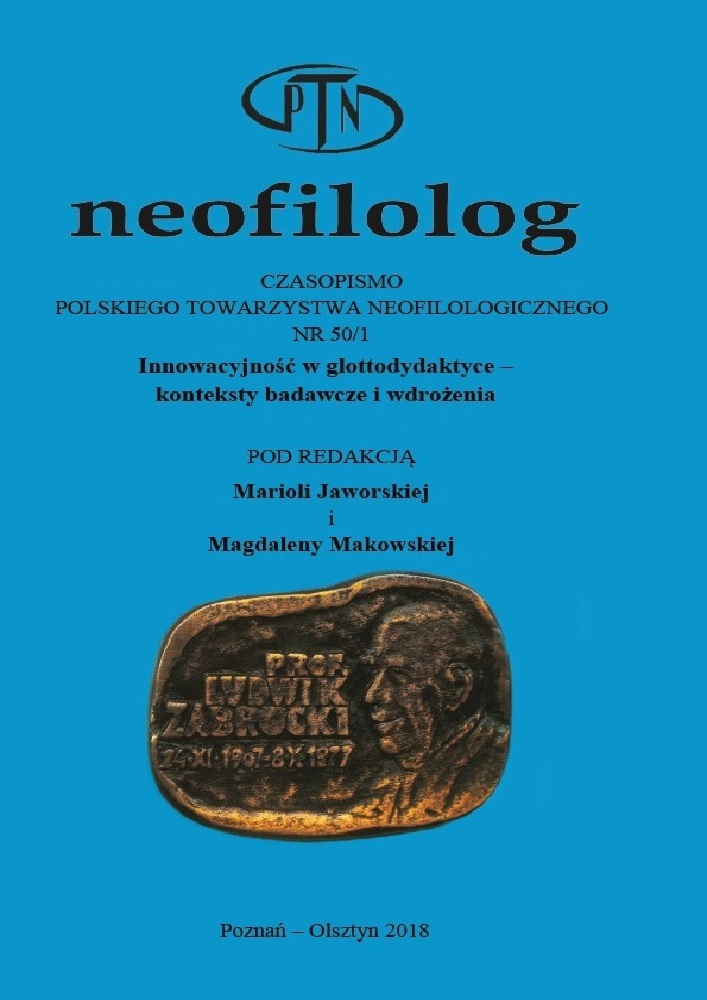Abstract
Beliefs reflect the way we think about different issues, attitudes and behaviours. Many of them are wrong, or – at best – simplified. Beliefs also relate to the didactics of foreign languages. This paper discusses the qualities, sources and consequences of these beliefs and presents the results of research conducted on a group of 434 students regarding beliefs among other individual variables and the process of learning a foreign language.References
Brodniak W.A. (2010), Podstawy socjologiczne współczesnej psychiatrii (w) Rybakowski J., Pużyński S., Wciórka J. (red.), Psychiatria, t. 1: Podstawy psychiatrii. Wrocław: Elsevier Urban & Partner, s. 276-293.
Byram M., Barrett M., Ipgrave J., Jackson R., Méndez Garcia M.C. (2009), Autobiography of intercultural encounters. Strasbourg: Council of Europe.
Byram M., Barrett M., Ipgrave J., Jackson R., Méndez Garcia M.C. (2011), Autobiografia spotkań międzykulturowych. Warszawa: Ośrodek Rozwoju Edukacji.
Chlewiński Z. (1992), Stereotypy: struktura, funkcja, geneza. Analiza interdyscyplinarna (w) Chlewiński Z., Kurcz I. (red.), Stereotypy i uprzedzenia. „Kolokwia Psychologiczne. Pismo Komitetu Nauk Psychologicznych PAN”, t. 1. Warszawa: Instytut Psychologii PAN, s. 7-28.
Dörnyei Z. (2005), The Psychology of the Language Learner. Individual Differences in Second Language Acquisition. Mahwah: Lawrence Erlbaum.
Drosio-Czaplińska J. (2015), Myśli przyczynowo-spiskowe (w) „Ja, My, Oni. Poradnik psychologiczny «Polityki»”, t. 18: Mechanika władzy. Psychologia i polityka, s. 110-111.
Horwitz E.K. (1988), The beliefs about language learning of beginning university foreign language students (w) „The Modern Language Journal”, nr 72(3), s. 283-294.
Legat M. (b.d.), Przekonania – skąd pochodzą i w jaki sposób nas kształtują. Online: http://www.szkolenia-lps.pl/news/9/61/Przekonania---skad-pochodza-i-w-jaki-sposob-nas-ksztaltuja [DW: 23.09.2017].
Lemańska-Lewandowska E. (2013), Nauczyciele a dyscyplina w klasie szkolnej. Przekonania – strategie – kierunki zmian. Bydgoszcz: Wydawnictwo Uniwersytetu Kazimierza Wielkiego.
Lesiak-Bielawska E.D. (2013), Różnice indywidualne w procesie akwizycji języka. Psychologiczne uwarunkowania dydaktyki języków obcych. Warszawa: Oficyna Wydawnicza Łośgraf.
Lippmann W. (1922), Public Opinion. New York: Harcourt, Brace and Co.
Michońska-Stadnik A. (2013), Teoretyczne i praktyczne podstawy weryfikacji wybranych teorii subiektywnych w kształceniu nauczycieli języków obcych. Wrocław: Wydawnictwo Uniwersytetu Wrocławskiego.
Pawlak M., Bartczak E., Lis Z., Marciniak I. (2006), Europejskie portfolio językowe dla uczniów szkół ponadgimnazjalnych i studentów. Warszawa: Centralny Ośrodek Doskonalenia Nauczycieli.
Pervin L.A. (2005), Psychologia osobowości. Gdańsk: Gdańskie Wydawnictwo Psychologiczne.
Smuk M. (2016), Od cech osobowości do kompetencji savoir-être – rozwijanie samoświadomości w nauce języków obcych. Lublin – Warszawa: Wydawnictwo Werset – Instytut Romanistyki Uniwersytetu Warszawskiego.
Sokołowska K., Sylburski M. (2016), Przekonania – stereotypy – nawyki. Ich wpływ na nasze życie. Warszawa: Difin.
Zimbardo P.G., Johnson R.L., McCann V. (2010), Psychologia. Kluczowe koncepcje. T. 4: Psychologia osobowości.Warszawa: Wydawnictwo Naukowe PWN.
License
Copyright (c) 2018 Maciej Smuk

This work is licensed under a Creative Commons Attribution-NoDerivatives 4.0 International License.
Authors
Authors of texts accepted for publication in Neofilolog are required to complete, sign and return to the Editorial team’s office the Agreement for granting a royalty-free license to works with a commitment to grant a CC sub-license.
Under the agreement, the authors of the texts published in Neofilolog grant Adam Mickiewicz University in Poznań a non-exclusive, royalty-free license and authorize the use of Attribution-NoDerivatives 4.0 International (CC BY-ND 4.0) Creative Commons sub-license.
The authors retain the right to the free disposal of the work.
Users
Interested Internet users are entitled to use works that have been published in Neofilolog since 2017, under the following conditions:
▪ attribution – obligation to provide, together with the distributed work, information about the authorship, title, source (link to the original work, DOI) and the license itself.
▪ no derivatives – the work must be preserved in its original form. Without the author's consent, it is not possible to distribute the modified work in the form of translations, publications, etc.
Copyrights are reserved for all texts published since 2017.
Miscellaneous
Adam Mickiewicz University in Poznań retains the property right as a whole (layout, graphic form, title, cover design, logo etc.).
